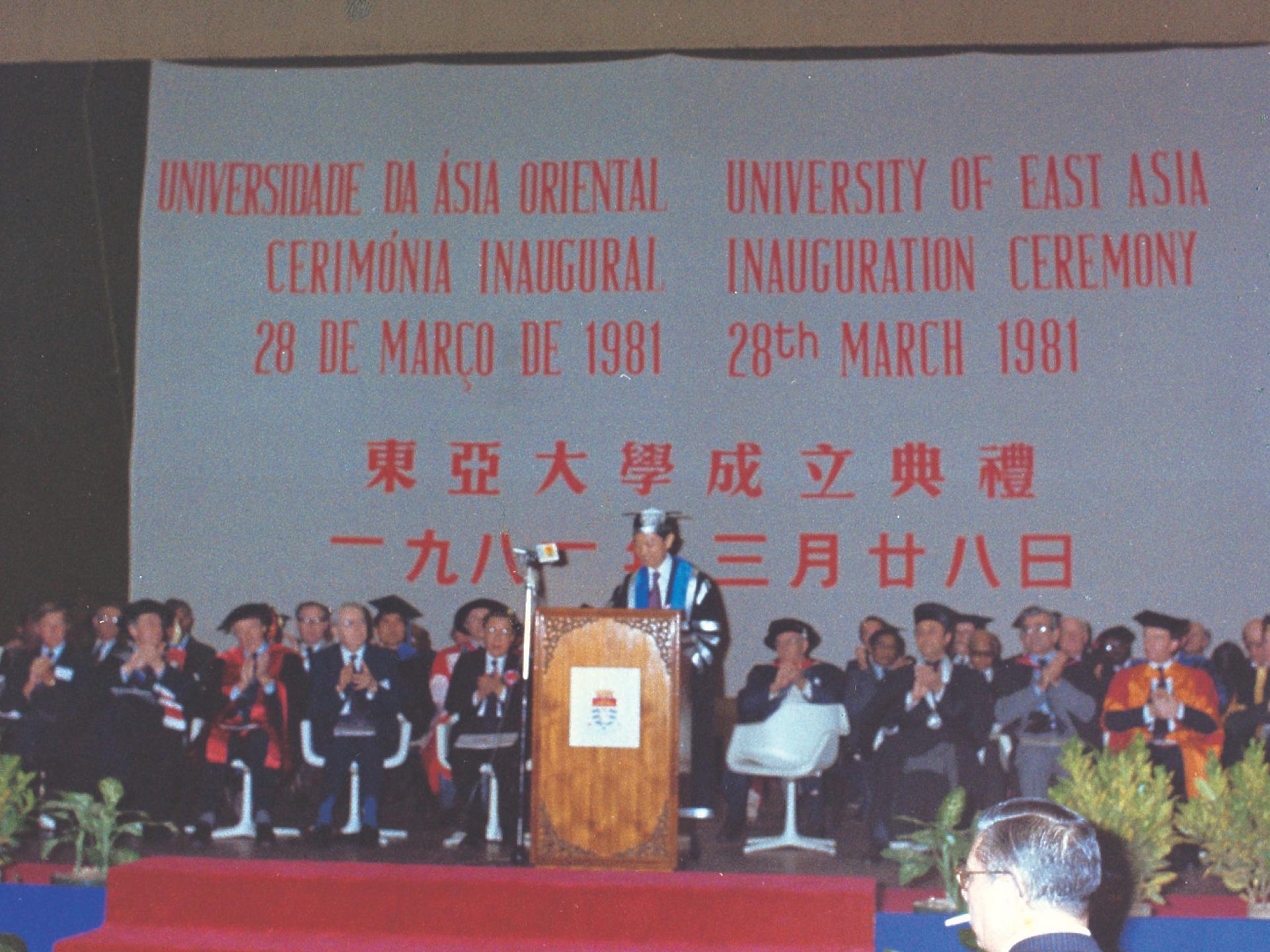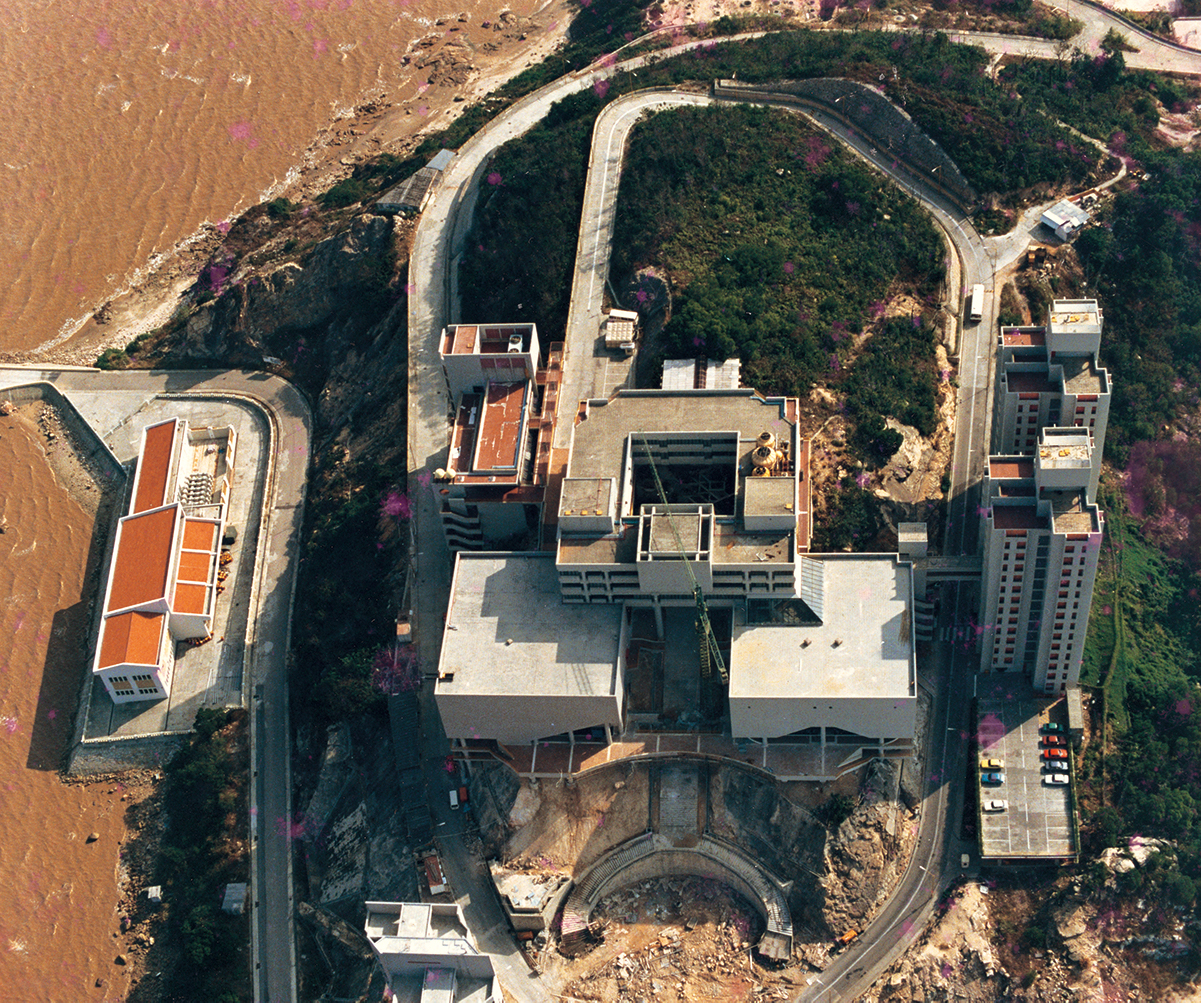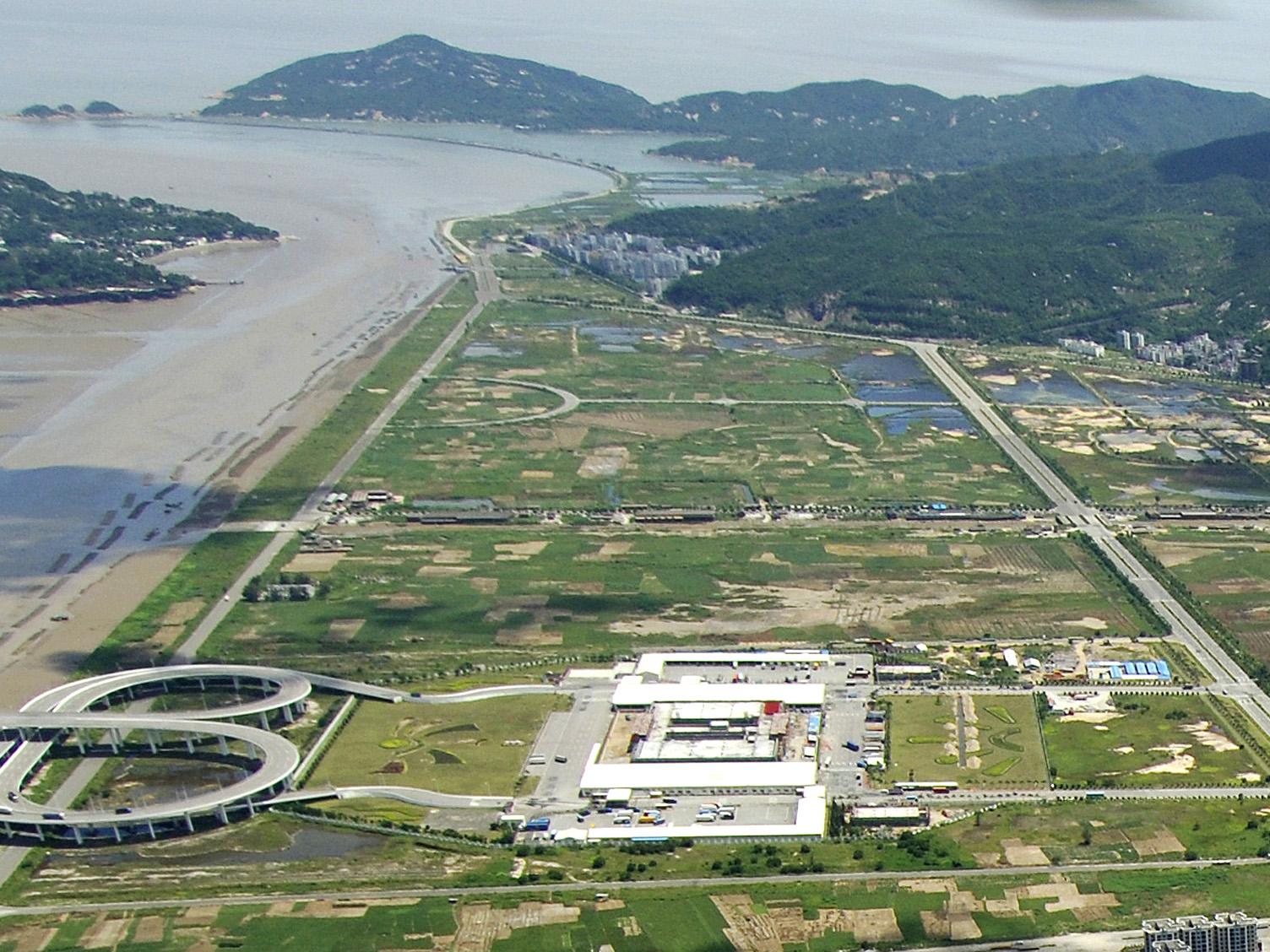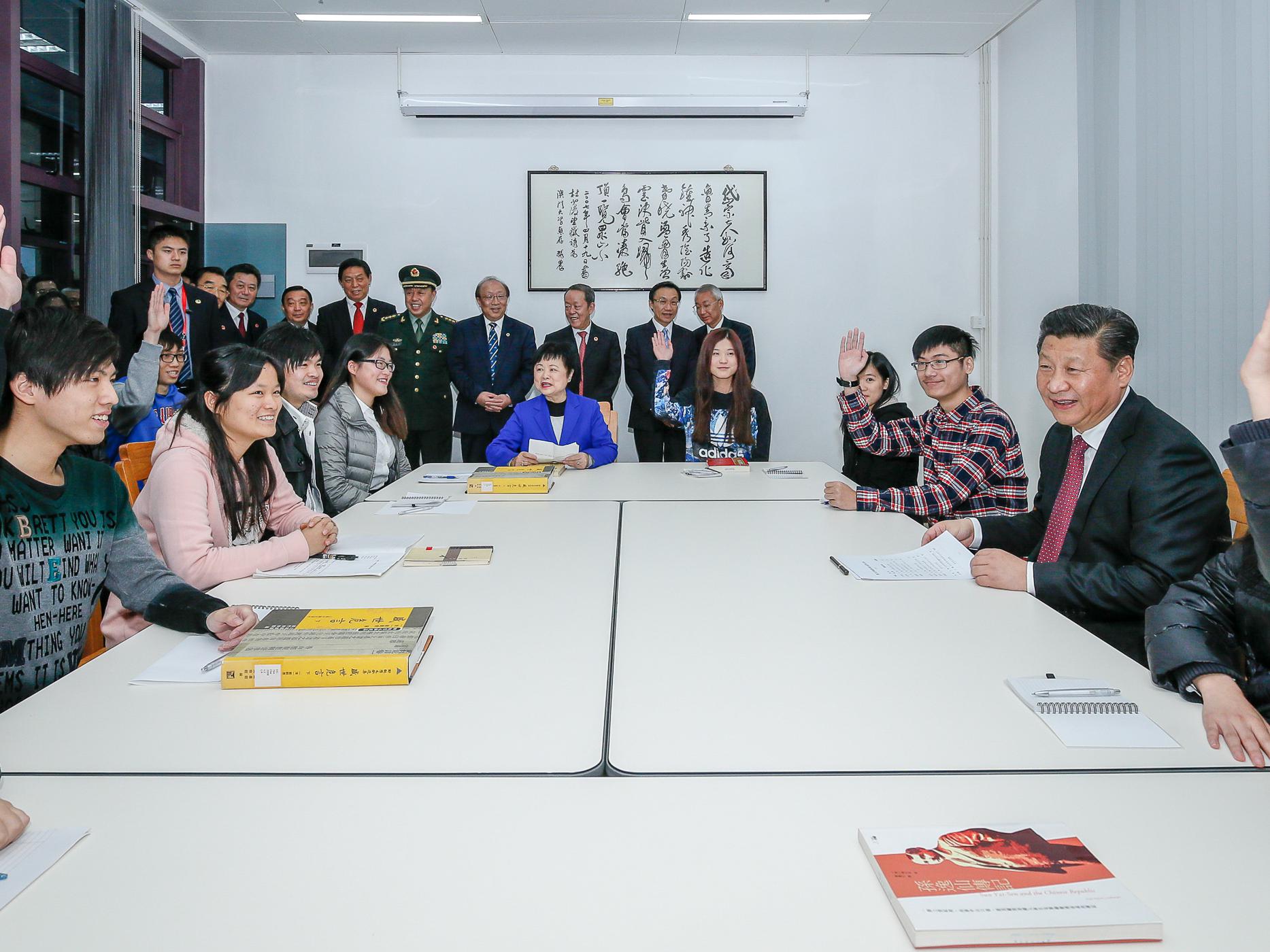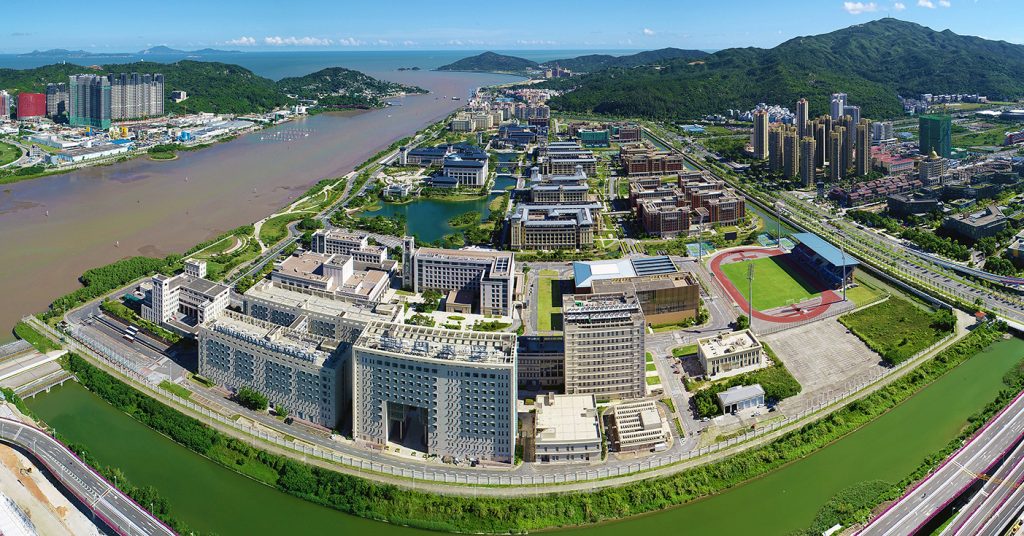1981
The University of East Asia (UEA), the predecessor of the University of Macau (UM), was founded. UEA was comprised of the University College, the College of Foundation Studies, and the College of Continuing Education.
1984
UM graduated its first cohort of undergraduate students and conferred its first honorary doctorate.
1987
The Centre for Macau Studies was established.
1988
The local government acquired and restructured UEA, revised the University Charter, and established the School of Arts and the School of Social Sciences.
1989
The Faculty of Business Administration, the Faculty of Science and Technology, and the Faculty of Education were established; the School of Arts launched its first Portuguese language programme.
1990
Undergraduate programmes changed from a three‐year system to a four‐year system. The University College was restructured.
1991
The Faculty of Law and the Research Centre for Luso‐Asian Studies were established.
UEA was renamed ‘University of Macau’, and the new Charter was promulgated.
1993
The Centre for Japanese Studies was established.
1995
UM successfully developed its first microelectronic chip; the Educational Research Centre and the Centre for Macao Law Studies were established.
1996
UM and several local organisations co‐established the Institute for the Development and Quality, Macau. UM also co‐founded the Institute of European Studies of Macau and launched the first master’s degree programme in European Studies.
1997
The first doctoral student graduated.
1999
UM launched PCT, the world’s first Chinese‐Portuguese bilingual audio dictionary, and organised a series of seminars to celebrate Macao’s return to China.
The Principals’ Recommended Admission Scheme was launched. Under this scheme, outstanding local students recommended by their principals are eligible to apply for direct admission to UM with exemption from the entrance examination.
Edmund Ho Hau Wah (left), the first chief executive of the Macao Special Administrative Region (SAR) and chancellor of UM, and then UM Rector Iu Vai Pan (right), officiated at the university’s first graduation ceremony and honorary doctorate conferment ceremony after Macao’s handover.
2001
The Macao SAR government restructured the University Council and initiated Charter revision in order to facilitate the implementation of an international mode of governance at the university.
2002
The English Language Centre and the Institute of Chinese Medical Sciences were established.
2003
The Centre for Information and Communication Technology in Education, the Centre for Engineering Research and Testing, and the Institute for the Study of Commercial Gaming were established.
2006
The Legislative Assembly of Macao passed the new Juridical Regime of the University of Macau, and the chief executive of Macao SAR promulgated the new Charter of the University of Macau. According to the Charter, the University Council is the highest collegial organ of the university.
2007
UM formulated the Ten‐Year Development Strategy, which includes the university’s vision for building a new campus.
2009
In January, during his visit to Macao, then Vice President Xi Jinping announced the central government’s decision to develop Hengqin Island. The new campus project officially kicked off.
On 27 June, the National People’s Congress Standing Committee adopted a bill that proposed authorising the Macao SAR to exercise jurisdiction over the new UM campus on Hengqin Island.
The University of Macau Development Foundation was established.
On 20 December, then State Counsellor Liu Yandong expressed hope at the new campus groundbreaking ceremony that UM would develop into a world‐class university with world‐class facilities, world‐class faculty members, world‐class graduates, and world‐class achievements.
On 20 December, then President Hu Jintao officiated at the groundbreaking ceremony for the new campus.
2010
Two residential colleges, the East Asia College (now known as the Stanley Ho East Asia College) and the Pearl Jubilee College (now known as the Henry Fok Pearl Jubilee College), were established.
2011
Zhuhai UM Science and Technology Research Institute and the Asia‐Pacific Academy of Economics and Management were established.
UM received approval from the central government to establish two state key laboratories, namely the State Key Laboratory of Analog and Mixed‐Signal VLSI, and the State Key Laboratory of Quality Research in Chinese Medicine.
2013
The Faculty of Health Sciences was established.
On 20 July, the new campus became operational and came under the jurisdiction of the Macao SAR.
On 5 November, then Vice Premier of the State Council Wang Yang officiated at the inauguration ceremony for the new campus.
2014
In August, UM completed relocation to the new campus and began to conduct all classes on the new campus in the 2014/2015 academic year.
The Institute of Applied Physics and Materials Engineering was established.
Six new residential colleges were established. They are Chao Kuang Piu College, Cheng Yu Tung College, Choi Kai Yau College, Lui Che 2018 Woo College, Moon Chun Memorial College, and Shiu Pong College.
On 20 December, President Xi Jinping visited UM.
2016
Two new residential colleges, namely Cheong Kun Lun College, and Ma Man Kei and Lo Pak Sam College, were established.
UM received the Medal of Merit‐Education from the Macao SAR government, becoming the first tertiary institution in Macao to receive this honour.
2017
The Centre for Chinese History and Culture, the Chinese‐Portuguese Bilingual Teaching and Training Centre, and the Institute of Collaborative Innovation were established.
Then UM Chancellor and Macao SAR Chief Executive Chui Sai On (centre), then Secretary for Social Affairs and Culture Tam Chon Weng (2nd from left), UM University Council Chair Lam Kam Seng (2nd from right), and then Rector Wei Zhao (1st from left) officiated at the university’s graduation ceremony.
2018
The Centre for Constitutional Law and Basic Law Studies, the Confucius Institute, the Institute of Microelectronics, the Macao Base for Primary & Secondary Education in Humanities & Social Sciences, and the Macao Base for Primary & Secondary STEM Education were established.
The Ministry of Education presented a gift to UM, ‘The Wall of Great Wisdom’ sculpture, which conveyed the hope that UM would continue to promote traditional Chinese culture and virtues.
Then Macao SAR Chief Executive and UM Chancellor Chui Sai On (centre), University Council Chair Lam Kam Seng (2nd from left), and UM Rector Yonghua Song (2nd from right) officiated at the university’s graduation ceremony.
UM received approval from the central government to establish its third state key laboratory, namely the State Key Laboratory of Internet of Things for Smart City.
President Xi Jinping sent a reply letter in response to a joint letter submitted by representatives of higher education institutions
in Macao. In the letter, President Xi expressed his hope that higher education institutions in Macao would nurture more graduates who love the country and Macao and attain more achievements in science and technology, so as to help promote economic diversification and sustainable development of Macao as well as the development of the Guangdong‐Hong Kong‐Macao Greater Bay Area.
2019
The Faculty of Business Administration received accreditation from the Association to Advance Collegiate Schools of Business, becoming the first business school in Macao to be accredited by the association. In the same year, FBA launched a Doctor of Business Administration programme.
UM established an industry‐academia collaboration base on Hengqin Island through the Zhuhai UM Science and Technology Research Institute.
On 1 October, a model of UM’s library, a landmark on the UM campus, was showcased on Macao’s float during the National Day Parade held in Beijing in celebration of the 70th anniversary of the People’s Republic of China.
In June, the Cultural Building was inaugurated. The building houses the Institute of Advanced Studies in Humanities and Social Sciences, the Centre for Chinese History and Culture, the Centre for Macau Studies, the Confucius Institute, the Chinese‐Portuguese Bilingual Teaching and Training Centre, the Centre for Arts and Design, and the Macao Base for Primary & Secondary Education in Humanities & Social Sciences.
The Centre for Cognitive and Brain Sciences, the Centre for Artificial Intelligence and Robotics, the Centre for Data Science, and the Centre
for Innovation and Entrepreneurship were established under the Institute of Collaborative Innovation.
2020
The Centre for Regional Oceans was unveiled.
UM’s Centre for Innovation and Entrepreneurship received approval to join China’s national system of co‐working space.
UM held an opening ceremony for the Public Administration Training Centre and the inaugural leadership training course designed for local civil servants, to help build a talent pipeline for the Macao SAR government.
2021
On 17 January, UM held an opening ceremony for the celebration of its 40th anniversary.
All articles in Set Sail for New Horizons on the 40th Anniversary:
Providing various services to society
Developing an international faculty team
Milestones of the University of Macau
Sources: UMagazine Issue 23

